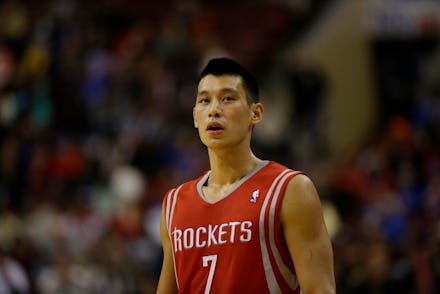Jeremy Lin Isn't the Only Christian Asian-American

Two months ago, producer Christopher Chen released Linsanity, a documentary following Houston Rockets point guard Jeremy Lin’s rise to stardom which explores the basketball player’s commitment to Christianity. The film recently spurred an interesting discussion on Huff Post Live about how Asian-Americans practice their Christian faith. All of the guests, including Chen, rapper MC Jin and spoken-word artist Jason Chu, seemed to agree that Asian-Americans openly embracing their faith is relatively new and misunderstood concept in America.
At a time when most Americans say that religion is losing its influence in the United States, to embrace it, as many Asian-Americans do, is a social taboo. Those who act on their faith, like Lin, are still small in numbers compared to other ethnic groups, even though Asian-American Christians are more inclined to say that living a religious life is an important goal. Practicing one’s faith openly, especially as an Asian-American like me, seems less realistic and less socially acceptable in America, as many millennials are increasingly losing theirs.
As a Chinese-American Catholic, I sometimes struggle to share my faith with others.
Part of the problem rests in the fact that I am not particularly devout. Even though I try my best to attend mass every Sunday and spend a lot of time with members of my church (many of whom I think of as my second family), I don’t necessarily espouse the same values that Catholicism preaches. I don’t believe in opposing gay marriage or that abortion should be completely banned. Many times, I even wonder whether God exists.
The other part of the problem is more complex. Aside from spending time with friends from church, I grew up around people who either didn’t take their faith seriously or were atheist. As I hung out with them more, I started questioning my own faith. I became less attentive to church teachings and more concerned with fitting in with my non-Catholic peers. They generally dismissed religion as a collection of brainwashing beliefs; their lifestyles seemed to run contrary to what the Church considered acceptable behavior. By the time I was in college, going to church felt more like a routine habit than a genuine interest.
I know my experience is not universal among all Asian-American Christians. I’ve noticed that Korean and Filipino Christians, for example, seem to embrace their faith more openly and share it with non-Christians more than other Asian Christian communities.
My religious community, however, tends to be more reserved. We welcome non-Catholics with open arms, but we rarely try to impose our faith on others. For the most part, we keep to ourselves, occasionally inviting non-Catholics to take a peek into our world. When I asked some of my Catholic friends why that has been the case, they were just as stumped as I was but tried their best to explain it.
"I guess it’s just not in our culture," said my friend Randy Eng, an active parish member. "It might be a generational thing."
Research seems to support his assertion. According to a 2007 survey of Asian-American churches, Asian-American Christians as a whole preferred serving their ministries through stewardship rather than expanding their global outreach or increasing their church’s external focus, making these communities exclusive in their own way.
Given that the religious climate among millennials is already dismal, I’m not sure whether Asian-Americans of faith will ever achieve the visibility that other faith communities possess. Although I sometimes reflect on what my faith means to me, I have yet to find an answer.
In many ways, my religion is just as socially taboo to me as it is to the rest of America.